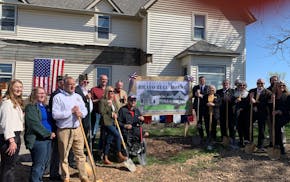A new winter sports and mountain biking complex at Theodore Wirth Park in Minneapolis could open sometime in the winter — if backers can raise the money to complete it.
The project, approved in concept in 2012, has risen in cost and been delayed by unforeseen conditions, but it continues to advance. The Park Board will consider leasing, operations and financial agreements for the Adventure and Welcome Center next month.
The project includes a new multiuse building serving cross-country skiers, tubers, snowboarders and bikers, plus two parking lots, relocated tubing and snowboarding areas, and modifications to the adjoining 18-hole golf course to accommodate the changes. It was estimated to cost $4.5 million when initially approved, but the price had risen to $8.7 million by last winter because of unexpected expenses.
The outdoor-activities-focused Loppet Foundation, best known for its annual weekend of ski and other winter sports racing, originally pledged to raise $3 million for the project. It raised $3.8 million but has upped its commitment to $5 million. A $1.73 million metro parks bonding grant would pay for much of the balance, but the project still had a $719,000 deficit last winter.
John Munger, the foundation's executive director, said the foundation is making progress toward the revised goal.
The latest proposal calls for the foundation to build the complex and then turn the building over to the park system.
Commissioner Anita Tabb said she wants some form of assurance that the project will be completed, such as posting a performance bond.
It's clear that the building won't be ready for the start of the winter sports season. But Munger and Michael Schroeder, assistant superintendent for the Park Board, said they expect to open the building before the end of the winter — a season lengthened at Wirth by snow-making equipment purchased with money from the foundation — if the board approves the plans next month.
Adam Arvidson, the Park Board's director of strategic planning, attributed cost increases to hiring consultants for a state environmental review, the choice of a more expensive option for reconfiguring the 18-hole golf course to accommodate the new complex, the need to install bigger water and sewer pipes, costlier stormwater management and inferior soils.
The foundation's business plan projects that it can make a slight profit operating the new complex with rentals and other income, compared to a Park Board loss of about $230,000 annually on the winter recreation area. Munger said that will happen because a superior area with better facilities will draw skiers and others who now go farther to ski on artificial snow.
Steve Brandt • 612-673-4438
Twitter: @brandtmpls

Defense attorneys in Feeding Our Future trial cast doubt on FBI's meal fraud investigation

Overdose deaths spike after incarceration, but Minnesota jails lack treatment

New sober house for veterans in southern Minnesota wants to treat the real issue: PTSD
Two North Loop condos combined into one 'dreamy' space listed for $649,900
